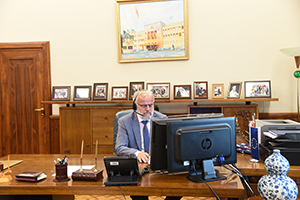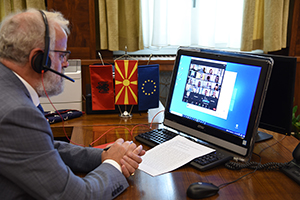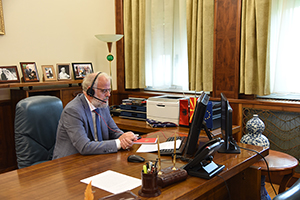 Friday, 1 October 2021
Friday, 1 October 2021
Address of President Xhaferi at the webinar on the topic:“Improving cooperation between parliamentarians and journalists for greater accountability and transparency“
Dear fellow Members of the Assembly,
Dear President of the Association of Journalists of North Macedonia, Mr. Chadikovski,
Dear representative of the Council of Europe, Mr. Penninckx, Dear representatives and journalists of the Association,
Representatives of the international and non-governmental organisations,
Dear media representatives,
Ladies and Gentlemen,
On behalf of the Members of the Assembly of the Republic of North Macedonia and on my own behalf, I would like to welcome the work of this webinar today, which I believe will confirm the idea we have for cooperation between the legislature and the journalists, and will also provide answers for the possible areas of improvement and ways to improve this cooperation. In a way, I also see this webinar as a follow-up on the discussion we had with you, dear journalists, at the July working meeting, to coordinate media policies and reforms, and I believe that this is a clear indicator of my availability and willingness to cooperate, and certainly of my fellow MPs and the Assembly itself. You know that the joint position of the presidency is for the Assembly to always be open and accessible for you, and through you - for the citizens, for the non-governmental organizations and, of course, the international public. As you already know, there is a group of accredited specialized rapporteurs for the Assembly among you, and this is not from now but something that has always existed; and in reality you are part of our institution because we meet regularly in the corridors and the halls of the Assembly. In addition, I have established a regular monthly briefing to which I regularly invite you, and I have never selected or excluded a particular journalist or media house from attending those joint meetings. A confirmation of this statement is the analysis itself and the statements of your fellow journalists who have no remarks in that part, except perhaps in the part that briefings should be convened outside that cycle, that is, when an issue arises that attracts great interest among citizens.
 I am aware that it is your duty to have information that you would convey as quickly as possible to the citizens, your readers. At the same time, this information should be credible, confirmed by official sources, supported, that is, with statements received from all parties involved on the issue. I, as President of the Assembly, can express my position and you know that I do that, but I can not and must not influence other fellow MPs in relation to how they will act. Each of them has his own personal opinion on how much and in what manner he will be present in the public. I do not want to go into whether each MP is allowed or who is allowed to express an opinion on a certain issue – it is a question of each parliamentary group individually, although, in my opinion, with the fact that we have received legitimacy from the citizens to represent them in the Assembly, the democratic right, personal integrity, viewpoint, and after all, the ideology we stand for, should be enough for us to be able to express an opinion. It is very important to understand that MPs are ordinary people whose lives suddenly become public, and it is understandable that not everyone manages in that role immediately, especially in the area of communication with journalists, the media. It is a fact that with the help of our donors and international partners, various workshops are organised to work on their public appearance and communication, however, the role of the journalist in this relationship is no less important. Namely, if the goal is to obtain an opinion, the questions must be clear and unambiguous, and the answers must be accurately and reliably conveyed so that there is no situation of correction or denial of a statement which in the meantime will certainly do harm, either to the MP, the parliamentary group, or the media, because all parties need to take care of their credibility.
I am aware that it is your duty to have information that you would convey as quickly as possible to the citizens, your readers. At the same time, this information should be credible, confirmed by official sources, supported, that is, with statements received from all parties involved on the issue. I, as President of the Assembly, can express my position and you know that I do that, but I can not and must not influence other fellow MPs in relation to how they will act. Each of them has his own personal opinion on how much and in what manner he will be present in the public. I do not want to go into whether each MP is allowed or who is allowed to express an opinion on a certain issue – it is a question of each parliamentary group individually, although, in my opinion, with the fact that we have received legitimacy from the citizens to represent them in the Assembly, the democratic right, personal integrity, viewpoint, and after all, the ideology we stand for, should be enough for us to be able to express an opinion. It is very important to understand that MPs are ordinary people whose lives suddenly become public, and it is understandable that not everyone manages in that role immediately, especially in the area of communication with journalists, the media. It is a fact that with the help of our donors and international partners, various workshops are organised to work on their public appearance and communication, however, the role of the journalist in this relationship is no less important. Namely, if the goal is to obtain an opinion, the questions must be clear and unambiguous, and the answers must be accurately and reliably conveyed so that there is no situation of correction or denial of a statement which in the meantime will certainly do harm, either to the MP, the parliamentary group, or the media, because all parties need to take care of their credibility.
 I know, you are not always able to get video footage, and I regret that due to the pandemic, emergency working protocols had to be imposed by health institutions, however, we as legislators had to adapt and still maintain the functionality of the institution. For that reason, and of course in order to protect public health and prevent further spread of the virus, the presence of journalists at the committee sessions, plenary sessions was banned, which automatically disabled your direct physical contact with the MPs and I know that it was a huge handicap. Unfortunately, the only possible live broadcast was only from the plenary session which were also held in the Hall under the dome in which we did not have the opportunity for electronic voting, which was also a handicap, and from the Boris Trajkovski Hall when the Finance and Budget Committee had a meeting. Unfortunately, the work of all other working bodies remained uncovered in the media and we are aware that this opened space for changing the opinion regarding the transparency in the work of the Assembly. You know that I had an attempt, instructed by examples in other parliaments, to switch to online working, in order to maintain the functionality of the institution, however, as you know, that attempt failed and was insisted upon the physical presence of the MPs in the halls. You know how the coming at work in the Assembly of the two MPs from home isolation was perceived.
I know, you are not always able to get video footage, and I regret that due to the pandemic, emergency working protocols had to be imposed by health institutions, however, we as legislators had to adapt and still maintain the functionality of the institution. For that reason, and of course in order to protect public health and prevent further spread of the virus, the presence of journalists at the committee sessions, plenary sessions was banned, which automatically disabled your direct physical contact with the MPs and I know that it was a huge handicap. Unfortunately, the only possible live broadcast was only from the plenary session which were also held in the Hall under the dome in which we did not have the opportunity for electronic voting, which was also a handicap, and from the Boris Trajkovski Hall when the Finance and Budget Committee had a meeting. Unfortunately, the work of all other working bodies remained uncovered in the media and we are aware that this opened space for changing the opinion regarding the transparency in the work of the Assembly. You know that I had an attempt, instructed by examples in other parliaments, to switch to online working, in order to maintain the functionality of the institution, however, as you know, that attempt failed and was insisted upon the physical presence of the MPs in the halls. You know how the coming at work in the Assembly of the two MPs from home isolation was perceived.
Unfortunately, MPs are not immune to the virus either and we have faced enormous difficulties in operating and providing a quorum. However, always keeping in mind the transparency in the work, being aware that it is a problem faced by all institutions, although the uniqueness of the legislature cannot be compared with any other institution, we were constantly looking for new solutions that will allow overcoming the technical obstacles to transparency, and fortunately, we have our long-time donors and partners, the Parliamentary Support Programme and, of course, the National Democratic Institute which will help in the establishment of the Assembly TV studio with a rich program of parliamentary life, interviews with MP and approximation of the draft legal solutions to the citizens in a simple and understandable language, namely, what real impact in the real life of the citizens will a certain legal solution produce. Streaming of committee meetings will be enabled, which will certainly capture the real atmosphere and the course of the debate to a great extent. It is planned to upgrade the website of the Assembly following the example of the Estonian Parliament, I hope at least to some extent, and I am convinced that all these activities which are planned for the next period, will bring the legislature closer to you dear journalists, citizens and the entire international public and will improve the impression of the Assembly of the Republic of North Macedonia. However, I will leave space for the details to be addressed by the representative of the National Democratic Institute.
I would stop here, thank you for your attention!